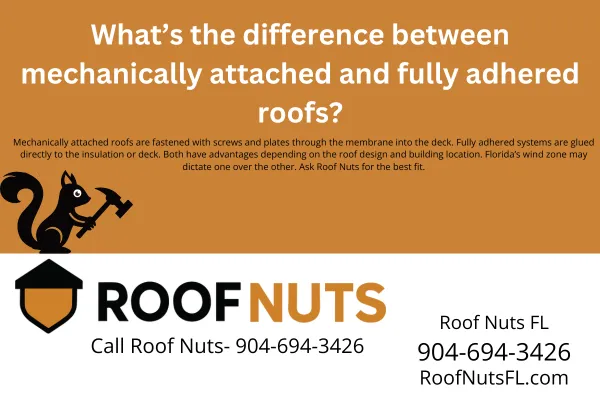
What’s the difference between mechanically attached and fully adhered roofs?
What’s the Difference Between Mechanically Attached and Fully Adhered Commercial Roofs?
When choosing a commercial roofing system in Florida, the method of attachment is a major decision. The two most common options for single-ply membranes like TPO and PVC are:
Mechanically Attached Roofs
Fastened with plates and screws through the membrane into the roof deck
Often installed in rows and seams, which are heat-welded afterward
Quicker installation, especially in large open roofs
Easier to inspect and repair
Best for: Wide-open commercial buildings with solid structural decks
Consider: May be more vulnerable in hurricane-prone coastal areas without proper edge securement
Fully Adhered Roofs
Membrane is glued directly to the insulation or roof deck using bonding adhesive
Creates a continuous seal, reducing flutter in high winds
Tighter, cleaner appearance and quieter under wind load
Best for: High-rise buildings, irregular layouts, or wind-exposed zones
Consider: Installation takes more time and surface prep; substrate must be smooth and compatible
What Matters in Florida?
Florida's High-Velocity Hurricane Zone (HVHZ), especially in Miami-Dade and Broward counties, enforces stricter attachment standards.
Wind uplift resistance is critical: Fully adhered systems usually perform better in uplift tests
Building height and exposure: Tall or coastal buildings benefit from fully adhered systems
Code compliance: Local building codes may dictate the attachment type
So Which One Should You Choose?
There’s no one-size-fits-all answer. Roof Nuts can help you choose the right system based on:
Your building’s structure
Location and wind zone
Insurance requirements
Budget and long-term ROI
FAQs
Is a fully adhered roof more expensive than mechanically attached?
Yes, it typically costs more due to added labor and adhesive materials. But it may offer better long-term durability and wind resistance.
Can you switch from a mechanically attached to a fully adhered system?
Yes, but it may require deck preparation or additional insulation layers. A site inspection is needed.
Which system is better for high winds?
Fully adhered systems usually offer better wind uplift performance, which is important in Florida’s hurricane-prone regions.
How do I know which is right for my building?
Call Roof Nuts at 904-694-3426 for a free roof assessment and guidance based on Florida codes and your specific needs.
Want to make sure your roof is Florida-wind-zone ready?
Call Roof Nuts today at 904-694-3426 for expert advice and reliable commercial roofing solutions.
We serve all across Florida—Jacksonville, Orlando, Tampa, Miami, and beyond.
